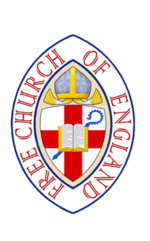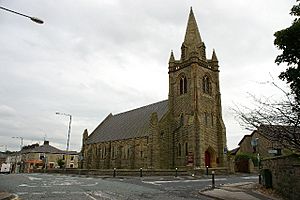Free Church of England facts for kids
Quick facts for kids Free Church of England |
|
|---|---|
 |
|
| Classification | Christian |
| Orientation | Anglican |
| Scripture | Christian Bible |
| Theology | Low church Anglicanism |
| Polity | Episcopal |
| Associations |
|
| Full Communion | Reformed Episcopal Church |
| Origin | 1844 |
| Separated from | Church of England |
| Congregations | 18 |
The Free Church of England (FCE) is a Christian church based in England. It is led by bishops, similar to how some other churches are organized. The church began in the mid-1800s when several groups of Christians decided to separate from the Church of England.
The FCE follows many traditions of the Anglican church, even though it is not part of the main Anglican Communion. Its worship style often uses the Book of Common Prayer. This book contains traditional prayers and services. The Church of England recognizes the FCE as a valid church. They even allow some shared activities between their clergy.
Contents
History of the Free Church of England
The Free Church of England was mainly started by Evangelical clergy and church groups. They were concerned about new ideas, called the Oxford Movement, that seemed to bring back older Catholic practices into the Church of England. The first FCE church group was formed in 1844 by Reverend James Shore in Bridgetown, Devon.
In its early years, many FCE clergy came from the Countess of Huntingdon's Connexion. This group had started in the 1700s during a time of religious revival. By the mid-1800s, this Connexion still kept many Anglican customs, like using the Book of Common Prayer.
The first Bishop of the FCE was Benjamin Price. He was in charge of all the new church groups. In 1874, the FCE connected with the Reformed Episcopal Church in North America.
In 1956, the FCE updated its Book of Common Prayer. The goal was to make the text clearer and remove phrases that could be misunderstood. These phrases had sometimes been used to support ideas that the FCE disagreed with.
In 2003, some bishops and churches left the FCE due to different beliefs. They formed a group called the Evangelical Connexion of the Free Church of England. This group is not officially part of the FCE. However, some of these churches later rejoined the FCE. For example, the church in Leigh-on-Sea returned to the FCE in 2023.
Church Leaders and Roles
The FCE has three main types of leaders: deacons, presbyters (also called priests), and bishops. Only men can become these leaders in the FCE. Since 2013, the Church of England has recognized these leaders as valid.
The church has continued to appoint bishops in a traditional way, known as apostolic succession. Bishops from other churches, like the Moravian Church and the Church of England, have sometimes taken part in these ceremonies.
How the Church is Organized
The FCE saw some growth in the early 1900s, having as many as 90 church groups at one point. However, after the Second World War, like many other churches in the UK, its numbers decreased. In recent years, there has been a small increase in the number of church groups. The FCE churches in the UK are divided into two main areas, called dioceses. These are the Northern Diocese and the Southern Diocese.
Northern Diocese
The current Bishop of the Northern Diocese is John Fenwick. He is also chosen each year to be the Bishop Primus, which is a leading role for all FCE bishops.
Churches in the Northern Diocese are found in the northern part of England, as well as in Wales, Scotland, and the Isle of Man. Many of these churches are in the Lancashire area. One of these churches even holds services in Farsi.
Southern Diocese
The current Bishop of the Southern Diocese is Paul Hunt.
Churches in the Southern Diocese are located in the southern part of England.
Official Recognition of Clergy
In January 2013, the Church of England announced that it recognized the leaders (clergy) of the Free Church of England. This decision came after about three years of discussions between the FCE bishops and various Church of England groups.
This recognition means that FCE clergy can be given permission to lead services in the Church of England. This is allowed under a special law from 1967. Some FCE clergy have received this permission while still being FCE leaders. The law also allows FCE bishops to perform ordinations and other bishop duties if asked by a Church of England bishop.
Relationships with Other Churches
The FCE is in full communion with the Reformed Episcopal Church. This means they share a close relationship and recognize each other's sacraments. The Reformed Episcopal Church is now part of the Anglican Church in North America.
Within the UK, the FCE is a member of the Free Churches Group and Churches Together in England. From 1992 to 1997, the FCE had official talks with the Church of England. This was seen as a positive step for unity.
FCE bishops have attended important events, such as the ceremonies for new Archbishops of Canterbury. Since 2013, the FCE has also been talking with the conservative Old Catholics of the Union of Scranton.
Anglican Realignment Movement
The FCE has been involved in a movement called the Anglican realignment. This movement aims to bring together Anglican churches that share similar traditional beliefs.
In 2009, the FCE was part of the launch of the Fellowship of Confessing Anglicans in the UK and Ireland. This group is part of the larger Global Anglican Future Conference (GAFCON) movement, which started in Jerusalem in 2008. The FCE has sent representatives to GAFCON conferences in Nairobi (2013), Jerusalem (2018), and Kigali (2023). Its bishops are part of GAFCON leadership groups.
In February 2016, Archbishop Foley Beach of the Anglican Church in North America signed an agreement. This agreement declared that the Anglican Church in North America and the Free Church of England are in full communion. It recognized their churches, clergy, and sacraments. Both churches pledged to work together to share the message of Jesus Christ around the world. This agreement was approved by the Anglican Church in North America in June 2016.
 | Emma Amos |
 | Edward Mitchell Bannister |
 | Larry D. Alexander |
 | Ernie Barnes |


